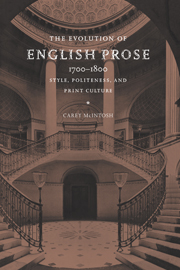Book contents
- Frontmatter
- Contents
- Preface
- 1 The ordering of English
- 2 Literacy and politeness: the gentrification of English prose
- 3 Testing the model
- 4 Loose and periodic sentences
- 5 Lofty language and low
- 6 Nominal and oral styles: Johnson and Richardson
- 7 The New Rhetoric of 1748 to 1793
- 8 The instruments of literacy
- 9 Politeness; feminization
- 10 Style and rhetoric
- Epilogue: language change
- References
- Index
6 - Nominal and oral styles: Johnson and Richardson
Published online by Cambridge University Press: 18 December 2009
- Frontmatter
- Contents
- Preface
- 1 The ordering of English
- 2 Literacy and politeness: the gentrification of English prose
- 3 Testing the model
- 4 Loose and periodic sentences
- 5 Lofty language and low
- 6 Nominal and oral styles: Johnson and Richardson
- 7 The New Rhetoric of 1748 to 1793
- 8 The instruments of literacy
- 9 Politeness; feminization
- 10 Style and rhetoric
- Epilogue: language change
- References
- Index
Summary
If we spoke as we write we should find no one to listen; and if we wrote as we speak we should find no one to read.
(T. S. Eliot, “Charles Whibley”: 1931)If some texts are “more written” than others, the chances are excellent that they will be “more nominal” as well. In a print culture, you could say, language is first frozen in type, then cloned onto pages, with the result that the abstractions and reified states of a nominal style are easier to understand. Or vice versa: nominal prose supplies the categories and fine distinctions into which a print culture tends to proliferate. In what follows, examples of nominal, verbal, oral, and written styles will be drawn from publications and private writings of the eighteenth and other centuries, including passages in Johnson, Swift, Godwin, Joyce, E. E. Cummings, and the Directions for Form 1040 of the Internal Revenue Service (USA).
MORE AND LESS IN ORALITY AND WRITTENNESS
In chapter 2, I mentioned the possibility of a graded polarity between orality and writtenness in texts or styles or language use. Many of the features that seemed to differentiate early eighteenth-century prose from more gentrified later texts have a motivation in this polarity; they suggest to us that in general what was published in the first quarter of the century was more closely affiliated to the world of speech than were publications after 1770. Conversely, late eighteenth-century prose is the prose of a print culture. On the one hand, interruptedness, solecisms, loose sentences, redundancies of various kinds (including initial coordinating conjunctions, doublets, and the pleonastic do), proverbs, physical words (as opposed to abstractions) – all these have a useful, natural function in speech (though they are also common enough in printed texts).
- Type
- Chapter
- Information
- The Evolution of English Prose, 1700–1800Style, Politeness, and Print Culture, pp. 117 - 141Publisher: Cambridge University PressPrint publication year: 1998



